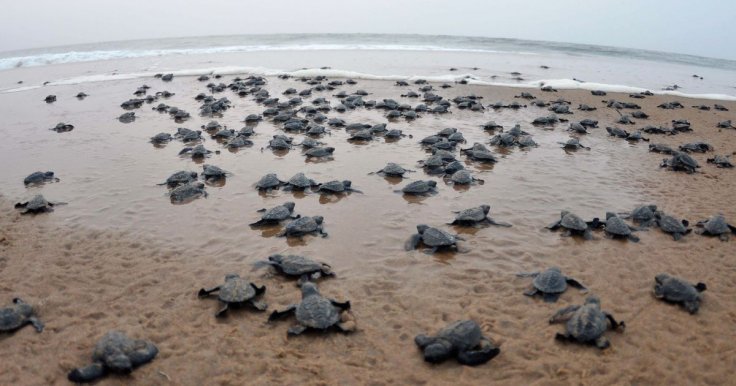Coronavirus, no doubt, is a killer, with more than 42,000 deaths caused till date. But the birds singing again, and the skies getting cleared are some anecdotes noted by many due to the restrictions and lockdowns. Along the coasts Odisha state of India, over 2,78,502 Olive Ridley sea turtles have nested till last Wednesday which came ashore spanning about 3.75 miles (six km).
These turtles were seen at Rushikulya beach digging for nests to lay eggs, starting from Marxh 20. This mass nesting is called arribada in Spanish. These came to the shores in groups of 5,000 to 10,000 at a time, said Amlan Nayak, the divisional forest officer, Berhampur, reports Down to Earth.

Sixty million eggs
The absence of these turtles were observed in 2002, 2007, 2016 and last year too. As per the forest services, over 250,000 mother turtles took part in daytime nesting process last week alone. These eggs usually take 45 days to hatch.
The event, in attracting huge number of tourists also creates some disturbance. But coronavirus has shooed away such a disturbance. It is estimated that about 60,000,000 eggs will be laid in this year, reports TMU
Protection for turtles
Presently, 25 forest guards and researchers are guarding the beach and the sea, in order to protect these turtles and eggs from other animals, said Rabindranath Sahu, a turtle researcher, who is the secretary of the area's Rushikulya Sea Turtle Protection Committee (RSTPC)
His team collects the eggs and buries them in fenced hatcheries, so that they incubate safely for two months. Each turtle can lay about 80 to 100 at a time. Now, the nearby villagers also protest these eggs, who, decades back were selling these very eggs, says Sahu.
The Forest Department has set up 11 off-shore camps early this year in order to monitor this beach. Back in 2018, Cyclone Titli hit the Bay of Bengal, the resulting floods left huge amount of waste, spanning about 8 km of the Rushikulya coast, this kept nesting of Olive Ridleys away last year, reported The Hindu









